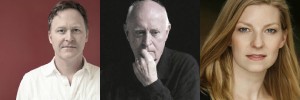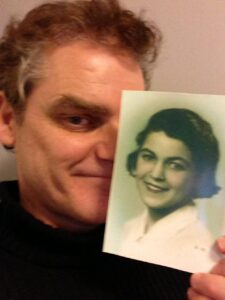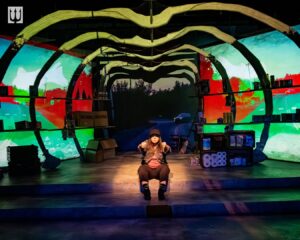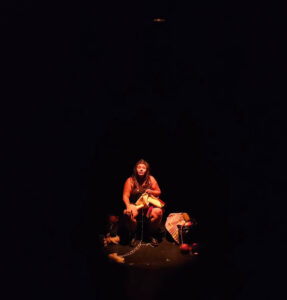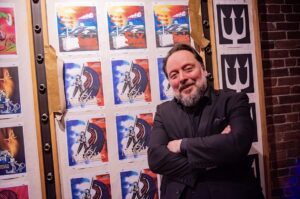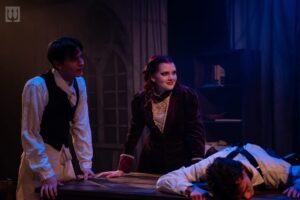alan dilworth, edward bond, maev beaty
I had the pleasure of chatting with Toronto-based director and playwright, Alan Dilworth and his lovely wife, actor and playwright Maev Beaty, via Skype (Toronto-Banff-Halifax) about their theatre company Sheep No Wool’s latest venture: The Edward Bond Festival. The excitement and passion that these two have for this project was unbridled and infectious. Fittingly, our discussion was far more of a three-way conversation than an interview and here is what we talked about:
Amanda Campbell (AC): I am so excited about your Edward Bond Festival. I have been reading about the events on the website and they look amazing! And Edward Bond is going to be there engaging with Canadian artists directing his work and speaking at a symposium. This is just really incredible! I can’t believe I’m going to miss it.
Alan Dilworth (AD): We’re so excited for it to happen! And we’re also sad that you won’t be here.
Maev Beaty (MB): Yes! We miss you here!! The Festival is really going to be a once in a lifetime opportunity for people to see these plays while also being able to connect with Edward Bond. The festival isn’t about anything too extraneous, it’s quite focused; here we have this playwright who has been writing for fifty years and still manages to speak urgently about the issues of this moment and of today. He is widely considered one of the best living playwrights and we have the opportunity to bring him to Toronto.
AD: It’s not a festival that fits the rubric of most festivals of this kind… or funding agencies as a whole. It was inspired by reading these pieces, his plays, which are shocking, but thrilling, and thinking of doing a series of workshops here. Bond was working on The Chair Plays in London and we had this phone conversation where he said to me that he would be really interested in seeing his work done by Canadian artists. Having just directed [Bond’s] The Bundle at Ryerson Theatre School, which was an extraordinary production, I thought, this could be the perfect time to create a festival of this sort and to invite him to be a part of it.
MB: The Bundle is such an epic play, it is just this huge, long, epic and then The Chair Plays are sort of more dystopian and spare, a really modern, lean story. Bond writes in such a plethora of different styles. He also has plays for youth. How many plays has he written in all, Alan?
AD: He has a huge number of published plays. He is one of the most prolific living playwrights in the world. He also has a great number of unpublished plays and he has written screenplays and opera. Let me just check before I give you an exact figure.
MB: What were your initial thoughts on what we have planned from what you have read, Amanda?
AC: Well, I guess the most interesting thing for me is that the festival is so focused on readings of plays and workshops of plays rather than fully-formed produced works. That seems quite unique for a Theatre Festival, to be so focused on the process rather than the product.
MB: Yes! We wanted to focus on him as a writer. We wanted the festival to be about the text and less about how a myriad of directors would interpret this work. We’re also really interested in the theory and the pedagogy of it. Bond often asks the question, “Why is theatre important?,” which is a question that we are all asking ourselves at the moment. He also distinguishes between “drama”, which he sees as being essential to humanity, and “theatre”, which he says is in danger of becoming a corrupted version of the art form.
AD: Bond sees “drama” as being implicitly human and that it is essential for us in our need to make sense of the world we live in. He sees “theatre” as being entertainment. We felt that we needed to do a festival of this sort so that we could offer our audience a smattering of different Bond plays. I just checked, so I can confirm that he has written over 50 plays. Like Maev said, they are written in many different styles, but ultimately he is always asking the same sorts of questions about justice and the corruption of authority, that has been constant in him for the last fifty years.
MB: We also wanted to focus the festival on readings because that way we can involve so many more theatre artists and different facets of the theatre community. These different theatre companies that we are working with may not have the money, the time, or, quite frankly, the interest, in staging a whole series of Bond plays, but done this way, they are able to contribute toward a reading. We have amazing theatre companies working with us from Convergence Theatre to Native Earth and even Stratford and Shaw. So, when you put all eleven events in this festival together it ends up being a really great tribute to Bond. It’s also really exciting to bring the community together in this way and to use these plays to examine questions that we feel are really essential, especially “What is theatre’s place in the world?” which is a question that appeals to people across communities, provinces, countries and tax brackets (laughs).
AD: Bond is concerned so much with what drama is and what its role in society should be, which could not be a more pertinent question right now after what has happened in Vancouver and just with the issues that companies face getting funding and with the government we have, not just federally, but provincially too, and as movements like Arab Spring and Occupy Wall Street and what is happening right now in Greece and other parts of Europe gain momentum, the issues and questions that Bond tackles in his work could not be more relevant. He is constantly asking what the difference is between a democracy and a corporate money-based economy. It is easy for us to become reactionary, but it is more important, and less common, for us to allow our dissent to move us toward thinking of big ideas that are looking forward to solutions. That’s what Edward Bond has always done. He isn’t just interested in expressing his frustration, but he is pulling his audience and his readers up and inspiring them to make a change and be informed. It is exciting to be able to have a conversation together rather than just being separately enraged.
MB: It’s really neat because I think that there is sort of a gap in knowledge transfer right now between an artist like Bond, who is quite a bit past retirement age, and the general public who tend to be so consumed with everything always going so fast and technology expanding and “is there a new App for that?” that there isn’t a lot of listening to our elders going on. The fact is that Bond is alive RIGHT NOW and we should be taking advantage of the opportunity to learn from him. Also, he is writing about all the issues that are so pertinent to the youth right now and his writing speaks about the importance of the youth in social change, so there is a natural desire to bring young people to his work because they both complement one another so well. That is one of the reasons why we are trying to keep our prices for all the events as low as possible. Most will be Pay What You Can. We want it to be really affordable for everyone, especially the young people. It is also another reason why we are having The Wrecking Ball as our culmination, because that tends to attract a lot of young people to come out to the theatre as well.
AD: There has been a sort of Bond resurgence lately. I just directed The Bundle at Ryerson and David Storch just directed Restoration at York. These plays really fire up the young people who are working on them. Once they really get inside them, they start feeling like Bond is really talking directly to them about the world right in this moment. And these are plays were written years ago! The Bundle is from 1977. But the young people connect to its questions so ardently, questions like, “Is it really fair that we have been handed down this imperfect world?” and “Why should we put up with corrupt structures of society that we didn’t create?” He is so full of passion.
MB: He doesn’t rest.
AD: He is so fully engaged in the now.
MB: Alan met with him in Cambridge and he lives in this sort of old fashioned cottage with his partner Elizabeth.
AD: Yes, he lives off this old country road in this cottage, with a garden all around it. He is an extraordinary man. A genius. I think he lives a very focused life. He is intensely serious, but also very funny in a quite subtle way. And he is extraordinarily generous. He really gives you the opportunity to engage with him and when he does, he is just so generous with his time and, really listening, and really seeing you and having amazing conversations.
MB: He is really about getting down to it, to the things that are truly important.
AD: He sees you. I heard this story once about a young boy who sent him a letter after he saw a production of (Bond’s) Bingo with Patrick Stewart at the Young Vic and this young boy, and he was young, probably in his late teens, wrote, “I feel like I have finally had the truth spoken to me and that most of what I have been told up until now has been lies. I have to meet you.” He felt that the media and the people on the television and even in film to some extent had been feeding him lies and finally there in the theatre had been this great voice of truth. And Bingo was written in the 70s! But still, for this boy, it resonated. So Bond met with him, and he had prepared all these questions for this young man because he really wanted to have a conversation about these issues and to hear things from this young person’s perspective.
MB: He’s not an autograph signer, Edward Bond, he really makes you get over here and talk with him and engage in all the questions he raises and to think deeply and critically.
AD: He is letting these people, generations younger than him, know that the way that they’re feeling and the disenchantment they have, they’re not alone. He is a truth seeker and that is not always easy.
MB: Maybe you should let Amanda ask you some questions, Al. (laughs) Do you have any questions?
AC: I do! I always do! This conversation is good though, I like it. Backing up a bit though, when I think of World Class Playwrights, the most immediately recognized and most often produced in our time, I tend to think more of Albee and Mamet, Kushner… I guess more American playwrights… or the ones The National Theatre of the World tackle in their Impromptu Splendors. (laughs) Edward Bond seems a little bit off the radar to me, which made me wonder how you first became so interested in his work?
AD: Initially I saw The Sea with the Actors Repertory Company in the 90s and I loved it. The poetic language seemed so simple, yet the further you delved into it the deeper it went. Then when I was doing my MFA at York I sort of rediscovered Bond when I read his Lear, which is his version of the Shakespeare play. I was struck dumb. I couldn’t do it for my thesis because it was too focused on one character and I needed an ensemble piece, but it hit me hard. It was so brutal and yet so human. Like in life, there was something so humane about it. My grandfather was a street kid in London and ended up living in this home for children on this farm, I have a lot of family in Northern Ireland, so there was something vey implicit in me about his work. I felt that he spoke the truth.
MB: I remember when Alan was reading Lear and it did sort of spark this voracious Bond period in him, where he was just reading everything he could get his hands on while he was doing his Masters. I remember a lot of Bond scripts laying around the apartment at that time and a very excited and engaged Alan.
AD: I really dove into his work. It’s interesting because for awhile he was almost in exile on the continent. He had this reputation of being this sort of “enfant terrible” and we think of that as being sort of sexy, but it really hasn’t been seen that way outside of London until the last twenty years or so. He has strong artistic collaborations with Birmingham’s Big Brum, which has premiered a lot of his recent work and he also now he has developed an artistic relationship in France, with Theatre National La Colline. It’s interesting that you say that Bond is sort of off the radar because elsewhere in the world he is considered to be one of the best loved English language playwrights.
AC: Which is really interesting for me, because when I researching for this interview, I encountered people saying that very same thing, yet, throughout my BA in Theatre Studies and my MA in Drama Studies, I only encountered Bond once, and it wasn’t even in a theatre class, it was in a British Literature class I took as an elective! We read Saved and that is my only connection to his work.
MB: I think a lot of people here too just encounter him through Saved, not speaking specifically about you, Amanda, but in general, and not only is that one of his oldest plays, it is certainly the one he is the most well-known for, but it isn’t really indicative of all the work that he has done since then. He has gone so far beyond Saved, which is another reason why it’s so great that we get to introduce audiences here to his other and more recent work.
AC: Alan, how did you get from voraciously reading his work to being able to chat with him on the telephone?
AD: Ross Manson and David Jansen had both been very focused on Bond when they were doing their Masters Degrees and they told me that I should get in touch with him because he was very generous in speaking to artists and academics and I was doing my thesis on The Bundle at the time. So, then Maev and I went to London and I got to meet up with him in person. He was so generous and just said, “Sure! Come to Cambridge Station and then you can come to our house for lunch.”
MB: It was the only sort of romantic trip that Alan and I had been able to go on at the time, and so it was funny when he said to me, “Um. Do you mind if we just take a few hours one day to go visit Edward Bond?” And I said, “Well. I really want to see The Victoria and Albert Museum, and so I’ll just plan to go that day.” So, I sent him off to go meet Bond on his own! (laughs)
AD: Elizabeth, his wife, met me at the station and the only way that I knew who I was looking for was that she was carrying this old bound copy of one of his plays and she was holding it with the back towards me where there was a photo of Bond. So I went to their house and we had tea and then a little while later Bond burst in and sort of looked me over and then we began chatting and after a little while he said, “Let’s go upstairs.” And that’s where his office was and we spent about three hours in there talking and pouring over ideas and his plays. It was really mind blowing.
MB: You recorded a lot of that, didn’t you? I think we have a very fuzzy recording of it somewhere.
AB: Yes. Those conversations and Bond’s work were really formative experiences for me in how I began to see myself as a theatre artist and the work that I became interested and invested in. His plays are these massive thoughts moving forward and connecting with an audience and it sort of brought together all my disparate interests. If you look at the plays that I have worked on in my career, from Euripides and certainly If We Were Birds and The Middle Place, I am constantly interested in questions of justice as well. Even the recent play that I wrote and directed The Unforgetting, I was dealing with the same inherent questions.
MB: Some people say that Edward Bond’s text is like the text in the Greeks. The dialogue is really distilled down, very spare and raw, which is really authentic to work on. You can’t fake this kind of dialogue or the whole play doesn’t work.
AD: Bond is really a master inheritor of the Greek tradition. I would use the same approach in a Bond piece in rehearsal as I would if I were directing a Greek tragedy. The language seems so simple because it is so spare and poetic; it is very hard.
AC: I think people often think, especially people who aren’t working in the theatre industry, that when you have those short, brief lines that it is a lot easier. There is less you have to memorize. (laughs) Whereas, in reality, it is difficult when you aren’t given a lot to work with, as opposed to in a monologue where often you are like, “Ah. Here is everything I need to know written down for me in a giant speech. Perfect.”
MB: You can’t hide in his stuff, as an actor. It’s very vulnerable that way.
AC: Can you talk a little about the Symposium?
AD: The Symposium is an event that is bringing together two people, Edward Bond and Chris Cooper, who is a British director from Big Brum in Birmingham, who is coming to Toronto for a couple days for the Festival too. At the symposium Bond and Cooper will be discussing and investigating the present state of society and asking what role drama is to play in this society. They will also be discussing the philosophy of the moment and what is happening in the world right now. I know that Bond has been fascinated with Arab Spring and that he also talks a lot about the idea of the unconscious society, that we are far less aware than we think we are about how we have been lulled to sleep by the figures of authority in our communities. Bond is one of the best playwrights in the world, but I also think that he is one of the greatest thinkers of our time. So, it is amazing to have the chance to hear him speak on these topics and to engage in a discussion of this sort with him.
MB: That is what we think is going to happen. But because he is so engaged and alive and aware, we know that the symposium is going to be that, specicifcally, but because he is so curious and passionate and immersed in the moment, we are prepared for the conversation to go in different directions as well. Just to have the chance to speak in this way with Edward Bond in a sort of Question and Answer format is worth the price of admission!
AD: It’s really radical. This is Bond’s first time to Canada too, so we’re hoping this is going to be just the beginning of a whole bunch of exciting visits!
AC: Can you explain to people who may not know what exactly The Wrecking Ball is?
AD: The Wrecking Ball # 13: A Political Theatre Cabaret. Playwrights are given a week to write a play on a theme, which is a current political issue, and then directors and writers are given a week to rehearse it.
MB: There is always a great turnout for The Wrecking Balls and it has this fantastic momentum behind it and Edward Bond is going to be there!
AC: Is The Wrecking Ball a national thing or international?
MB: It started in Toronto and I know it has moved from province to province, but I’m not sure if it has become international yet.
AC: Ah. So this will be Edward Bond’s first Wrecking Ball! Ugh. I am so upset I’m missing this.
MB: We are trying to do what we can to get people across the country involved and included in the work that we’re doing throughout the festival. I know, I’m in Banff now and working with actors from Vancouver and Alberta and all the West, who are pulling their hair out saying, “WHY ARE WE MISSING THIS” So, whenever we can we are trying to think of ways to archive the event and record the symposium and maybe live stream or live tweet… we are trying to do whatever we can to share it beyond Toronto.
AC: Perfect. Please let me know! I want to see and hear as much as I can!! Is there anything else that you would like to tell me?
AD: I just want to touch a bit on our IndieGoGo Campaign. We are mounting this festival all by ourselves, and it has been incredible the support that we have received so far for this miracle on a shoestring. Any generous support toward our $5,000 goal goes a long way. We have over 50 theatre artists involved in the readings and workshops and we are really working hard to make sure that all these events are as affordable and accessible as possible and so we’re appealing to the community for help. The theatre community has responded in such a positive way, Tarragon Theatre, Ryerson University Theatre Department, the Theatre Centre… Also the artists who have donated their time and their talents to our readings and workshops are phenomenal. David Jansen. Alex Poch-Goldin. Allegra Fullerton. Karen Robinson. Ryan Kelly. Ron Kennell. Tanja Jacobs. R.H. Thompson. Andrew Moodie. Julie Tepperman. And there are more. It’s kind of impossible how much talent is involved in this festival.
MB: And Fancy-Pants actors at Stratford!
AC: Sounds dreamy.
As of May 31st, 2012 The Edward Bond Festival has raised $3,635 toward its $5,000 goal. There are 22 days left in the campaign. Please help support this amazing and exciting endeavor! Click on this link to donate!
The following is borrowed from www.alandilworth.com. “The Edward Bond Festival takes place in Toronto and other locations across Southern Ontario from June 12-20th. It consists of eleven encounters featuring over fifty Canadian theatre artists and twelve theatre companies in ten days. In the spirit of Bond’s work we are keeping ticket prices affordable to ensure the participation of youth, and to make engagement for individuals at multiple events, possible.
The festival is made up of eleven encounters: six workshop readings of Bond’s works, a workshop presentation of Bond’s play Have I None with the collaboration of Bond himself before a live audience, a Symposium featuring Edward Bond and UK director Chris Cooper, and an acclaimed Ryerson Theatre School remount production of Bond’s epic play The Bundle. The festival culminates with The Wrecking Ball #13, Toronto’s political theatre cabaret.
The focus of the Edward Bond Festival will be two-fold: the investigation of the evolution of Bond’s vision of drama with a special focus on the Chair Plays: Have I None, Chair, and The Under Room. The second focus is an investigation of ‘post-Stanislavsky’ methodologies for interpreting and staging raw, spare, poetic texts.
Please come out from June 12th-20th 2012, and engage with one of the most extraordinary living playwrights, and a remarkable team of Canadian directors, actors, designers and producers.” For more information please visit this website.

